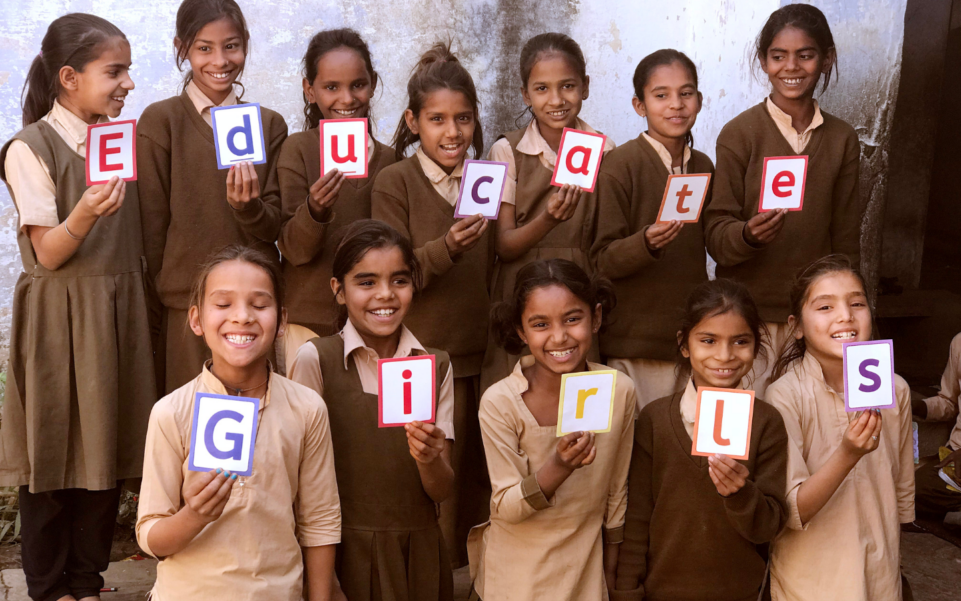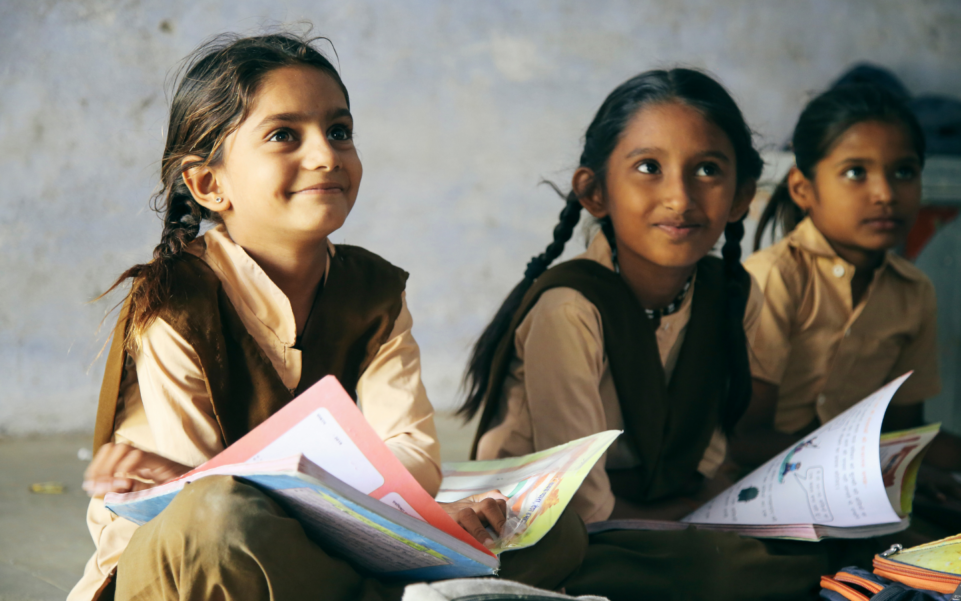The problem: sociocultural barriers keep girls out of school.
Educate Girls operates in over 18,000+ villages in three states of Rajasthan, Madhya Pradesh, and Uttar Pradesh in India. By leveraging the Government’s existing investment in schools and engaging with 18,000+ community volunteers, Educate Girls work towards the enrollment and retention of girls and improving foundational skills in literacy and numeracy for all children (both girls and boys). Since its inception, with the help of a network of 18,000+ community volunteers, Educate Girls has successfully enrolled over 1.4 million out-of-school girls into schools and retained an average of 92% of them year-on-year and improved learning outcomes for over 1.9 million children through its learning curriculum.
India faces a significant gender disparity in education, particularly in the central and northern states of the country [1]. 5.8 Million girls aged 5-15 are out of school and at the permanent risk of never entering a classroom and completing their education. Exacerbating the issue of access to education, the quality of education provided in government primary schools is mostly very weak, resulting in poor learning outcomes.
Girls, especially those in rural areas, are often expected to adhere to regressive deep rooted social and patriarchal norms. Therefore, they are confined to doing household chores, agricultural work and even early marriages. The ripple effects of not educating a girl manifest in issues ranging from child marriages, early pregnancy, poor health, lower self-esteem, becoming vulnerable to abuse, limited economic potential and an overall lack of well being and reduced personal agency. Research shows that enrolling girls in schools and improving their learning outcomes can lead to better outcomes across all of these dimensions.
The solution: change mindsets and improve the quality of schooling.
Educate Girls works towards holistically tackling issues at the root of gender inequality in India’s educational system. Research finds that it is essential to work closely with local communities to change mindsets rooted in gender inequality to effectively address sociocultural barriers that prevent girls from accessing education. Educate Girls works with the government, community and village-based volunteers called Team Balika to ensure every girl in the remotest parts of India is enrolled in school and learns well.
Educate Girls tackles the problem at its roots by focussing on the following key activities:
- Increasing girls’ enrollment and retention of marginalized girls in rural geographies.
- Improve quality of learning by implementing a remedial curriculum in school thereby improving the learning outcomes for students.
- Increasing the involvement and capacity of communities in school management thereby improving school governance and infrastructure.
- Enhancing motivation and self-esteem of girls, and promoting girl leadership through Bal Sabha.
The organization has mobilised 1.2 million girls aged 6-14 years for enrollment to date, retained 90% of them year on year and improved learning outcomes for 1.7 million students.

How Educate Girls works
Educate Girls Primary Program has two main objectives:
1. Enrollment of out-of-school girls (OOSG), and retention of 90% of the enrolled girls year on year.
- Identification and enrollment of out of school girls:
Educate Girls’ staff and community volunteers (Team Balika) conducts a census-like extensive activity known as door-to-door survey that helps in identifying the exact number of girls who are out of school. Having identified the OOSG, Team Balika persuades and convinces the parents of each girl to enroll her in school. - School Management Committee (SMC) orientation and training & School Improvement Plans (SIP):
In order to improve the school administration, Educate Girls facilitates the formalization of a 15-member council to form the School Management Committee (SMC). This consists of parents, teachers and village leaders and is responsible for school governance and administration. Then, Educate Girls trains the committee members and provides them with handholding support to prepare and execute School Improvement Plans (SIP) and conduct school assessments. The SIPs are prepared by the SMC for improvement of the school infrastructure like separate toilets for girls, electricity, water, roof, boundary etc., jointly with support of Educate Girls’ staff. The SIP once prepared is then submitted to the District Task Force of the government to unlock the state funding. - Bal Sabha (Girls’ Council) formation and Life Skills Training:
Educate Girls facilitates the formation of the democratically-elected Bal Sabha (Girls’ Council) for girls in grades 6-8. This 13-member council gives the girls a voice and a leadership position in the school. Educate Girls’ staff and Team Balika impart training in “life skills” to boost confidence, communication, leadership, public speaking, health, sanitation, critical thinking and problem solving skills through various games throughout the academic year.
2. Improved Learning outcomes
- Remedial learning curriculum implementation: Gyan Ka Pitara (Repository of Knowledge):
In order to improve foundational learning levels (numeracy and literacy), curriculum is implemented in schools for children in grade 3, 4 and 5. The curriculum is implemented with the use of specially designed kits called Gyan ka Pitara (GKP). The learning tools focus on building micro-competencies in English, Hindi and Math. Each kit contains over 250 worksheets per child, ensuring no child is left behind. While designing the kits, the needs of the most marginalized children have been taken into account to make sure that the curriculum is child-friendly and context-specific. - Baseline & Endline evaluation of learning curriculum:
In line with guidelines of widely accepted and used ASER tools, a pre-test is conducted before GKP handholding to ascertain the learning levels of the children. The effectiveness of the learning curriculum is ascertained by conducting post-test at the end of the academic year after the curriculum is implemented in schools.
Educate Girls primary program model complements the existing government set up to usher in a holistic systemic reform for the girls in rural parts of India.

